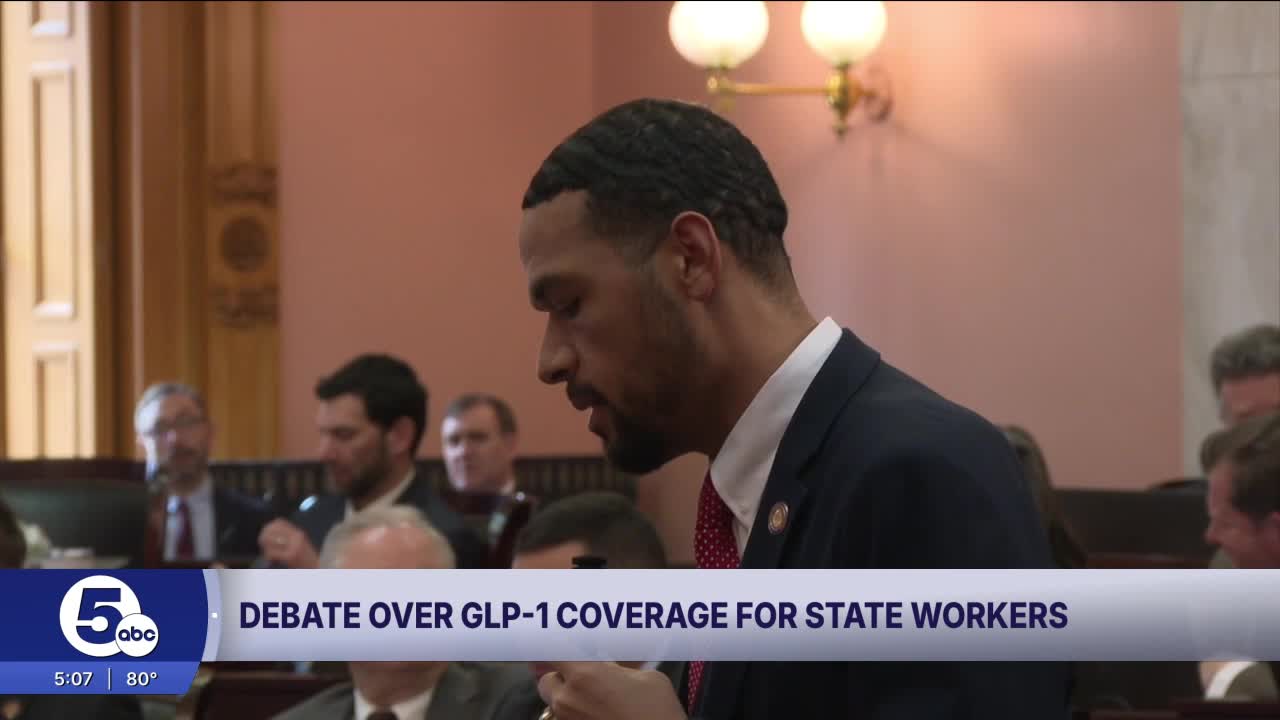COLUMBUS, Ohio — Lawmakers are trying to restore access to GLP-1 weight loss drugs, like Ozempic and Wegovy, after Ohio removed medical coverage for state employees.
When he was 21 years old, Josh Williams fell 30 feet off the side of a train, crushing his spine — causing 20 years of pain.
"I underwent a lot of back surgeries and at one point I grew to 458 pounds in my heaviest," Williams said. "I was on prescription opiates for over a decade, and it ruined my metabolism."
His struggle to lose the weight exacerbated his back pain, he said, but one drug made all the difference.
"It really did save my life," he added. "It allowed me to get out of bed and get back into the workforce."
Williams, a Republican state representative, is now introducing legislation to help other state employees access the medication.
The Ohio Department of Administrative Services (DAS) announced that starting July 1st, GLP-1 medications would no longer be covered by the state’s benefits plan for weight loss. It will still be covered for diabetes.
"The State of Ohio covered GLP-1 medications for weight loss since July of 2022. However, our costs for GLP-1 medications for weight loss continued to escalate despite our implementation of cost containment measures," DAS spokesperson J.C. Benton said in an email statement. "The decision to stop coverage was a difficult, but a fiscally necessary one... DAS has worked tirelessly to maintain a generous, competitive benefits plan for all 106,000 state employees and their dependents."
DAS is offering health coaching, nutrition and incentive programs and online classes for weight loss, instead, Benton continued.
"I wish they would have reached out to legislators for a chance to fix this," Williams said.
He created a fix of his own, authoring H.B. 388, which would require DAS to reimburse employees up to $500 per month in the first year of GLP-1 treatment and up to $250 per month in the second year. To qualify, applicants must provide proof of a body mass index (BMI) of 30 or greater, a physician’s diagnosis and documentation of payment.
The bill is bipartisan, cosponsored by state Rep. Dontavius Jarrells (D-Columbus).
"This legislation ensures that state employees access FDA-approved, life-saving medications without being burdened by extreme out-of-pocket costs,” Jarrells said. “We’re creating a pathway to better health outcomes while acknowledging the importance of preventative care in fighting chronic diseases like obesity and diabetes.”
DAS was unable to do an interview with us, but Case Western Reserve University medical law professor Sharona Hoffman explained that the sudden popularity of GLP-1 products has dramatically increased prices.
According to estimates by DAS and confirmed by Gov. Mike DeWine's team for FY25, the 3,500 employees on the medications have cost the state roughly $40 million.
"It makes sense if you have budget constraints to try to figure out what you can eliminate," Hoffman said. "I'm not that surprised they're focusing on this."
She highlighted how beneficial they can be for people who have applicable medical issues, but added that not everyone truly needs the weight loss drugs.
"For some people, it's really elective, it's a cosmetic thing and they're not in danger of health problems," the professor said. "Health insurance usually does not cover elective treatments."
Removing coverage for the drugs isn’t unique to Ohio, she said.
"Only about half the states currently provide coverage for these drugs for non-diabetes purposes," she said.
Some insurance companies are also restricting or denying coverage for GLP-1 medications used for weight loss, such as Blue Cross Blue Shield and Anthem.
Although Williams is frustrated by DAS, he also blames pharmacy benefit managers — PBMs — for the high cost.
RELATED: Ohio attorney general and 38 others call on Congress to stop middlemen from owning pharmacies
"We are pleased that Rep. Williams is bringing to light the high cost that GLP-1 medications for weight loss has had on the state health plan and look forward to working with him," Benton said.
Williams said they should have come to him first, since his proposal would reduce the cost for DAS from $40 million to about $20 million. With other reductions he made, he estimated that there would end up being only 2,000 employees enrolled, equalling about $9 million in costs.
"I think this is a great drug that's proven to be safe," Williams said. "Our employees should have access to it if it's medically necessary."
Williams, who is now running for Congress, said that he will not benefit from his proposal since he will not be in the legislature. He hopes to unseat longtime U.S. Rep. Marcy Kaptur of Ohio's 9th District.





